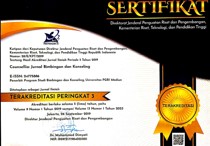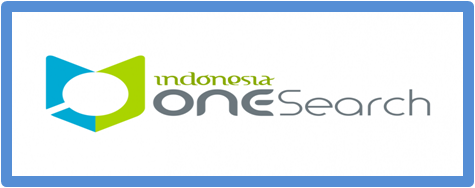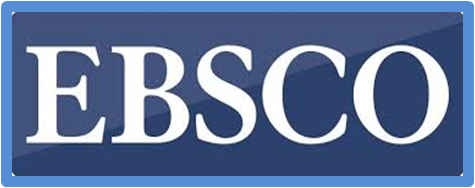Academic Dishonesty Siswa di Masa Pandemi Covid-19: Implikasinya pada Bimbingan dan Konseling
Abstract
Academic dishonesty yaitu perilaku menyimpang dari aturan akademik yang dilakukan oleh siswa di berbagai jenjang pendidikan untuk mendapatkan hasil ujian atau pengakuan yang baik atas tugas akademiknya dengan jalan mencontek, plagiarisme, bekerja sama dalam kecurangan ujian, maupun memalsukan data. Artikel ini bertujuan untuk mengekplorasi tingkat adacemic dishonesty siswa pada masa pandemi covid-19 dilihat dari perbedaan jenis kelamin, tingkatan kelas serta usia. Metode penelitian yang digunakan yaitu survey dengan jenis cross sectional survey design yang melibatkan 493 siswa sekolah menengah kejuruan yang dipilih menggunakan teknik cluster sampling. Instrumen pengumpulan data penelitian menggunakan academic dishonesty scale. Teknik analisis data yang dilakukan yaitu analisis deskriptif, uji t-test dan Uji Anova. Hasil penelitian membuktikan bahwa siswa sekolah memengah kejuruan memiliki tingkat academic dishonesty pada kategori sedang. Lebih lanjut penelitian ini menemukan bahwa dilihat dari perbedaan jenis kelamin siswa laki-laki memiliki tingkat academic dishonesty lebih tinggi dari siswa perempuan. Hal yang sama juga terjadi ketika dilihat dari setiap indikator academic dishonesty. Pada perbedaan kelas dan perbedaan usia menunjukkan bahwa tidak ada perbedaan yang signifikan antara siswa kelas 10 dan siswa kelas 12 serta siswa berusia 15, 16, 17, 18 dalam tingkat academic dishonesty. Diskusi lebih lanjut dibahas dalam artikel ini.
Abstrac: Academic dishonestyis behavior deviating from academic rules carried out by students at various levels of education to get good test results or recognition of their academic assignments by cheating, plagiarism, cooperating in exam fraud, or falsifying data. This article aims to explore and determine the level of student academic dishonestyduring the Covid-19 pandemic seen from differences in gender, grade level and age. The research method used is a survey with a type of cross sectional survey design involving 493 vocational high school students who were selected using cluster sampling technique.. The research data collection instrument uses an academic dishonestyscale. The data analysis technique used is descriptive analysis, t-test and Anova test. The results of the study prove that vocational high school students have a level of academic dishonestyin the medium category. Furthermore, this study found that seen from the gender differences, male students had a higher level of academic dishonestythan female students. The same thing also happens when viewed from each indicator of academic dishonesty. In terms of class differences and age differences, it shows that there is no significant difference between grade 10 and grade 12 students and students aged 15, 16, 17, 18 in the level of academic dishonesty. Further discussion is discussed in this article
Keywords
Full Text:
PDFReferences
Allen, J. M., Wright, S., Cranston, N., Watson, J., Beswick, K., & Hay, I. (2018). Raising levels of school student engagement and retention in rural, regional and disadvantaged areas: is it a lost cause? International Journal of Inclusive Education, 22(4), 409–425. https://doi.org/10.1080/13603116.2017.1370737
American School Counselor Association. (2012). The ASCA National Model: A Framework for School Counseling Programs, Third Edition. American School Counselor Association.
Amzalag, M., Shapira, N., & Dolev, N. (2021). Two Sides of the Coin: Lack of Academic Integrity in Exams During the Corona Pandemic, Students’ and Lecturers’ Perceptions. Journal of Academic Ethics, 0123456789. https://doi.org/10.1007/s10805-021-09413-5
Bakker, A. B. ., Sanz Vergel, A. I., & Kuntze, J. (2015). Student engagement and performance: A weekly diary study on the role of openness. Motivation and Emotion, 39(1), 49–62. https://doi.org/10.1007/s11031-014-9422-5
Bandura, A. (1991). Social cognitive theory of self-regulation. Organizational Behavior and Human Decision Processes, 50(2), 248–287.
Barnard, A., Schurink, W., & De Beer, M. (2012). A conceptual framework of integrity. SA Journal of Industrial Psychology, 34(2), 40–49. https://doi.org/10.4102/sajip.v34i2.427
Biswas, A. E. (2014). Lessons in Citizenship: Using Collaboration in the Classroom to Build Community, Foster Academic Integrity, and Model Civic Responsibility. Journal on Excellence in College Teaching, 25(1), 9–25.
Churiyah, M., Sholikhan, Filianti, & Sakdiyyah, D. A. (2020). Indonesia Education Readiness Conducting Distance Learning in Covid-19 Pandemic Situation. International Journal of Multicultural and Multireligious Understanding (IJMMU), 7(6), 491–507.
Code, J., Ralph, R., & Forde, K. (2020). Pandemic designs for the future: perspectives of technology education teachers during COVID-19. Information and Learning Science, 121(5–6), 409–421. https://doi.org/10.1108/ILS-04-2020-0112
Cohen, T. R., & Morse, L. (2014). Moral character: What it is and what it does. Research in Organizational Behavior, 34(December), 43–61. https://doi.org/10.1016/j.riob.2014.08.003
Corlatean, T. (2020). Risks, discrimination and opportunities for education during the times of COVID-19 pandemic. Rais, June, 1–10. https://doi.org/10.5281/zenodo.3909867
Creswell, J. W. (2012). Research Design Pendekatan Kualitatif,. Kuantitatif, dan Mixed. Pustaka Pelajar.
Cuadrado, D., Salgado, J. F., & Moscoso, S. (2019). Prevalence and correlates of academic dishonesty: Towards a sustainable university. Sustainability (Switzerland), 11(21). https://doi.org/10.3390/su11216062
Desmita. (2010). Psikologi perkembangan. PT. Remaja Rosdakarya.
Dong, C., Cao, S., & Li, H. (2020). Young children’s online learning during COVID-19 pandemic: Chinese parents’ beliefs and attitudes. Children and Youth Services Review, 118(September), 105440. https://doi.org/10.1016/j.childyouth.2020.105440
Elsalem, L., Al-Azzam, N., Jum’ah, A. A., & Obeidat, N. (2021). Remote E-exams during Covid-19 pandemic: A cross-sectional study of students’ preferences and academic dishonesty in faculties of medical sciences. Annals of Medicine and Surgery, 62(January), 326–333. https://doi.org/10.1016/j.amsu.2021.01.054
Elsalem, L., Al-Azzam, N., Jum’ah, A. A., Obeidat, N., Sindiani, A. M., & Kheirallah, K. A. (2020). Stress and behavioral changes with remote E-exams during the Covid-19 pandemic: A cross-sectional study among undergraduates of medical sciences. Annals of Medicine and Surgery, 60(October), 271–279. https://doi.org/10.1016/j.amsu.2020.10.058
Eysenck, M. W. (2004). Psychology: An international perspective. Psychology Press.
Fiialka, S. (2020). School Media Education During the COVID–19 Pandemic: Limitations and New Opportunities. Media Education (Mediaobrazovanie), 60(3), 367–374. https://doi.org/10.13187/me.2020.3.367
Fraenkel, J. R. A. N. E. W. (2009). How to Design and Evaluate. Research in Education. McGraw-Hill Companies, Inc.
Geldard, K., & Geldard, D. (2011). Konseling remaja. Pustaka Pelajar.
Genereux, R. L., & McLeod, B. A. (1995). Circumstances surrounding cheating: A questionnaire study of college students. Research in Higher Education, 36(6), 687–704. https://doi.org/10.1007/BF02208251
Gentina, E., Tang, T. L. P., & Gu, Q. (2017). Does Bad Company Corrupt Good Morals? Social Bonding and Academic Cheating among French and Chinese Teens. Journal of Business Ethics, 146(3), 639–667. https://doi.org/10.1007/s10551-015-2939-z
Hebebci, M. T., Bertiz, Y., & Alan, S. (2020). Investigation of Views of Students and Teachers on Distance Education Practices during the Coronavirus (COVID-19) Pandemic. International Journal of Technology in Education and Science, 4(4), 267–282. https://doi.org/10.46328/ijtes.v4i4.113
Hidayat, D., Anisti, Purwadhi, & Wibawa, D. (2020). Crisis management and communication experience in education during the covid – 19 pandemic in indonesia. Jurnal Komunikasi: Malaysian Journal of Communication, 36(3), 67–82. https://doi.org/10.17576/JKMJC-2020-3603-05
Hurlock, E. B. (2003). Psikologi Perkembangan Suatu Pendekatan Sepanjang Rentang Kehidupan. Erlangga.
Idrus, F., Asadi, Z., & Mokhtar, N. (2016). Academic dishonesty and Achievement Motivation : A Delicate Relationship. Higher Education of Social Science, 11(1), 1–8. https://doi.org/10.3968/8738
Ives, B., & Giukin, L. (2020). Patterns and Predictors of Academic dishonesty in Moldovan University Students. Journal of Academic Ethics, 18(1), 71–88. https://doi.org/10.1007/s10805-019-09347-z
Jena, P. K. (2020). Impact of Pandemic COVID-19 on Education in India. International Journal of Current Research (IJCR), July. https://doi.org/10.31235/osf.io/2kasu
Kidd, W., & Murray, J. (2020). The Covid-19 pandemic and its effects on teacher education in England: how teacher educators moved practicum learning online. European Journal of Teacher Education, 43(4), 542–558. https://doi.org/10.1080/02619768.2020.1820480
Knapp, J. C., & M. Hulbert, A. (2017). Ghostwriting and the Ethics of Authenticity. In Ghostwriting and the Ethics of Authenticity. Palgrave Macmillan. https://doi.org/10.1057/978-1-137-31313-3
Lawson, R. A. (2004). Is classroom cheating related to business students’ propensity to cheat in the “real world”? Journal of Business Ethics, 49(2), 189–199. https://doi.org/10.1023/B:BUSI.0000015784.34148.cb
Lee, S. D., Kuncel, N. R., & Gau, J. (2020). Personality, attitude, and demographic correlates of academic dishonesty: A meta-analysis. Psychological Bulletin, 146(11), 1042–1058. https://doi.org/https://psycnet.apa.org/doi/10.1037/bul0000300
Malhotra, K. (2020). Psychological & Social Effects of Pandemic Covid-19 on Education System, Business Growth, Economic Crisis & Health Issues Globally. Cosmos An International Journal of Management & IT, 11(2), 40. https://doi.org/10.46360/globus.mgt.120201007
Martin, H. (2010). Bimbingan dan konseling di sekolah. Kanisius.
Melnyk, Y. B., Pypenko, I. S., & Maslov, Y. V. (2020). COVID-19 pandemic as a factor revolutionizing the industry of higher education. Rupkatha Journal on Interdisciplinary Studies in Humanities, 12(5), 1–6. https://doi.org/10.21659/RUPKATHA.V12N5.RIOC1S19N2
Meng, C. L., Othman, J., D’Silva, J. L., & Omar, Z. (2014). Ethical Decision Making in Academic dishonesty with Application of Modified Theory of Planned Behavior: A Review. International Education Studies, 7(3). https://doi.org/10.5539/ies.v7n3p126
Miller, A. D., Murdock, T. B., & Grotewiel, M. M. (2017). Addressing Academic dishonesty Among the Highest Achievers. Theory into Practice, 56(2), 121–128. https://doi.org/10.1080/00405841.2017.1283574
Molnar, K. K. (2015). Students’ Perceptions of Academic Dishonesty: A Nine-Year Study from 2005 to 2013. Journal of Academic Ethics, 13(2), 135–150. https://doi.org/10.1007/s10805-015-9231-9
Moralista, R. B., & Oducado, R. M. F. (2020). Faculty perception toward online education in a state college in the Philippines during the coronavirus disease 19 (COVID-19) pandemic. Universal Journal of Educational Research, 8(10), 4736–4742. https://doi.org/10.13189/ujer.2020.081044
Mukhtar, K., Javed, K., Arooj, M., & Sethi, A. (2020). Advantages, limitations and recommendations for online learning during covid-19 pandemic era. Pakistan Journal of Medical Sciences, 36(COVID19-S4), S27–S31. https://doi.org/10.12669/pjms.36.COVID19-S4.2785
Nucci, L., & Turiel, E. (2009). Capturing the complexity of moral development and education. Mind, Brain, and Education, 3(3), 151–159. https://doi.org/10.1111/j.1751-228X.2009.01065.x
Nugroho, I. S., Sutoyo, A., & Sunawan, S. (2020). How do Middle School Student Trusts Predicted Moral Disengagement and Incivility? Jurnal Bimbingan Konseling, 9(85), 56–63. https://journal.unnes.ac.id/sju/index.php/jubk/article/view/35930
Nurihsan, J., Y., & Yusuf, S. . (2010). Landasan bimbingan dan konseling. Rosdakarya.
Özcan, M., Yeniçeri, N., & Çekiç, E. G. (2019). The impact of gender and academic achievement on the violation of academic integrity for medical faculty students, a descriptive cross-sectional survey study. BMC Medical Education, 19(1), 1–8. https://doi.org/10.1186/s12909-019-1865-7
Parker, E. T., Barnhardt, C. L., Pascarella, E. T., & McCowin, J. A. (2016). The impact of diversity courses on college students’ moral development. Journal of College Student Development, 57(4), 395–410. https://doi.org/10.1353/csd.2016.0050
Pratiwi, M. S., & Adiyanti, M. G. (2017). Studi Pendahuluan : Emosi Moral Pada Remaja. Jurnal Psikologi Perseptual, 2(2), 69–87. https://doi.org/10.24176/perseptual.v2i2.2672
Rasmitadila, Aliyyah, R. R., Rachmadtullah, R., Samsudin, A., Syaodih, E., Nurtanto, M., & Tambunan, A. R. S. (2020). The perceptions of primary school teachers of online learning during the covid-19 pandemic period: A case study in Indonesia. Journal of Ethnic and Cultural Studies, 7(2), 90–109. https://doi.org/10.29333/ejecs/388
Santrock, J. W. (2013). Life-span development 14th ed. McGraw-Hill Companies, Inc.
Sideridis, G. D., Tsaousis, I., & Al Harbi, K. (2016). Predicting Academic dishonesty on National Examinations: The Roles of Gender, Previous Performance, Examination Center Change, City Change, and Region Change. Ethics and Behavior, 26(3), 215–237. https://doi.org/10.1080/10508422.2015.1009630
Sidi, Y., Blau, I., & Eshet-Alkalai, Y. (2019). How is the ethical dissonance index affected by technology, academic dishonesty type and individual differences? British Journal of Educational Technology, 50(6), 3300–3314. https://doi.org/10.1111/bjet.12735
Sigelman, C. K., & Rider, E. A. (2018). Life-span human development. Cengange Learning.
Stephens, J. M. (2018). Bridging the divide: The role of motivation and self-regulation in explaining the judgment-action gap related to academic dishonesty. Frontiers in Psychology, 9(MAR), 1–15. https://doi.org/10.3389/fpsyg.2018.00246
Susanto, A. (2018). Bimbingan dan konseling di Sekolah: Konsep, teori, dan aplikasinya. Pradamedia Group Devisi Kencana.
Toquero, C. M. (2020). Challenges and Opportunities for Higher Education amid the COVID-19 Pandemic: The Philippine Context. Pedagogical Research, 5(4), em0063. https://doi.org/10.29333/pr/7947
Witmer, H., & Johansson, J. (2015). Disciplinary action for academic dishonesty: Does the student’s gender matter? International Journal for Educational Integrity, 11(1). https://doi.org/10.1007/s40979-015-0006-2
Yadav, B. (2020). Psychological and Social Effect of Pandemic Covid-19 on Education System. Globus Journal OfProgressive Education, 11(2), 28–39. https://doi.org/10.46360/globus.xxxxxxxx
Zhang, Y., Yin, H., & Zheng, L. (2018). Investigating academic dishonesty among Chinese undergraduate students: does gender matter? Assessment and Evaluation in Higher Education, 43(5), 812–826. https://doi.org/10.1080/02602938.2017.1411467
Article Metrics
Abstract has been read : 2026 timesPDF file viewed/downloaded: 0 times
DOI: http://doi.org/10.25273/counsellia.v11i2.9168
Refbacks
- There are currently no refbacks.
Counsellia is Indexed By:
Counsellia Office:
Universitas PGRI Madiun
Program Studi Bimbingan dan Konseling

This work is licensed under a Creative Commons Attribution-NonCommercial-ShareAlike 4.0 International License.














